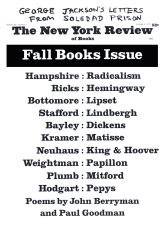In response to:
Cultivating Voltaire from the June 18, 1970 issue
To the Editors:
At least two-thirds of Mr. Weightman’s long review of Besterman’s and Wade’s books on Voltaire (NYR, June 18) is a happily innocent vulgarization of material we might have found in even the most casual introduction to a college text, including the usual vagaries about Voltaire’s “clear and honest mind” (as usual, set against Rousseau’s “original and complex brain”) and the usual assessment of Voltaire’s tragedies and poetry: they were bad. It would be impossible to salt Mr. Weightman’s wings in a short letter. And would I really want to: the flight is so confident, and he is so bent on nesting, in the end, on his own interpretation of Candide. Only one or two points then.
Mr. Weightman takes Mr. Wade to task for the way he assesses Voltaire’s theater. Mr. Wade made the mistake of being too tentative:
We can never be sure that we are looking at Voltaire’s drama in the right perspective…. Our defense would have to be couched in terms of the eighteenth-century audience.
(The same would apply to Voltaire’s poetry.) Now this is an important point; it forces us into thorny problems of aesthetic relativism and the history of taste. Mr. Wade, an empathetic spirit who has read Voltaire from cover to cover and who knows the century well, chose the safe, agnostic position—even though Mr. Weightman calls him “self-contradictory” for saying that Voltaire was “justly proud” of his plays. If Mr. Wade tries to get into the skin of an eighteenth-century audience, he can, without contradiction, consider Voltaire’s theater as successful in some measure. Mr. Weightman, however, has no respect for that audience, which produced “a collective aberration of taste.” Yet that aberration is precisely what we have to understand, as Mr. Wade suggests. All taste, as Pierre Francastel has brilliantly shown, is aberration from what precedes it. Why certain tastes find favor in modern eyes, why art nouveau and even Diderot and Pope have suddenly boomed after long “neglect” is something for Mr. Weightman to consider. I for one am not yet convinced that Voltaire’s theater and French eighteenth-century poetry outside of Chénier are junk. (Was the printing, in the belly of Mr. Weightman’s review, of Richard Wilbur’s stunning translation of Voltaire’s poem of 1741 designed to make the point?) Their appeal is to a kind of social intelligence and to an aesthetic orientation that Mr. Weightman cannot share. The loss, I suppose, is his.
As for Mr. Weightman’s interpretation of Candide, there is room for it, though perhaps not in a review of other men’s work. It modifies an earlier, more suggestive article. Mr. Weightman here as elsewhere in the review is too anxious to press his point, and the result is a pancake instead of a soufflé. So he finds a “conclusion, which is at once unbelievable and inescapable” and an explanation of that overstressed clue to the story’s meaning: “Il faut cultiver notre jardin“—which he cites as “Il faut cultiver son jardin.” In any case, Mr. Weightman would be hard pressed to prove that Candide and his little troupe could, in their garden, prevail against those forces of God and Nature which have tossed them from pillar to post throughout the preceding parts. La belle résolution! The fact is there are other clues, linguistic and structural, as Roy Wolper has recently claimed, and our interpretations had best be dialectical and tentative.
Jack Undank
Department of Romance Languages
College of Arts and Sciences
Rutgers, The State University
New Brunswick, New Jersey
John Weightman replies:
I would not claim to have said anything new about Voltaire; I simply rearranged the well-known material and showed, incidentally, where I ventured to disagree with the arrangements of Mr. Besterman and Professor Wade. What else would Mr. Undank have a reviewer do?
On the question of fashions in taste, I accept the relativist position up to a point. Some works of art can be revived. But I should be astonished if this were true of Voltaire’s tragedies or of any other eighteenth-century neo-classical tragedies. Having had to read and reread a number of these works with students, I think they are poor of their kind, and are no more likely to be resuscitated than the mass of nineteenth-century bourgeois drama.
My quarrel with Professor Wade is that his “safe, agnostic position” does not get “inside the skin” of the eighteenth-century audience, or inside the problem at all, I see it rather as a timid beating about the bush through a refusal to have a critical opinion. Quite frankly, it is better to have an honest opinion which may be wrong but which one is prepared to discuss than to take refuge in the unhelpful assumption that “great writers” must in some sense always write “great works.”
About the poetry I am prepared to admit that I may be mistaken. I too was struck by the fact that the translation (which I had not seen before I received the printed copy) had merits. Perhaps Voltaire, as a writer of light verse, is better than I said and may again find an audience. I can only say that I have read quite a lot of eighteenth-century French verse by him and other people and I would judge it to be very minor compared to Chénier on the one hand and Pope on the other. I am convinced that the Poème sur le désastre de Lisbonne is no masterpiece, whereas Candide is.
As for Mr. Undank’s last paragraph, I fail to make sense of it. He seems to be arguing on my side, but the tone clearly indicates that he is not. I would have been quite happy to have produced a respectable pancake rather than a soufflé, but I don’t think we have understood each other.
This Issue
October 8, 1970



